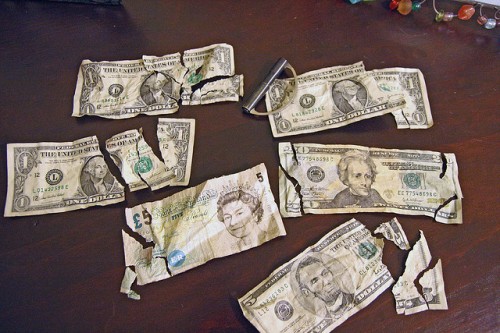
When you look at the situation rationally, it really shouldn’t matter what your paper money looks like. Intellectually, we all know that a brand new $20 bill isn’t worth any more than an old and crumpled $20 bill and vice-versa. Those facts, however, don’t seem to override the social inclinations that newer is better. According to Fabrizio Di Muro (University of Winnipeg) and Theodore J. Noseworthy, the two authors of the study, the physical appearance of the money we have can influence our spending habits.
What’s really interesting is that it depends on the social situation on how your spending habits will change. In most cases, you are better off having new, crisp bills in your wallet if you want to save money. In several studies of consumer spending habits, the researches found that consumers would tend to spend more if they had older, worn bills than if they had the same amount in newer, crisp bills. Not only did the study find that consumers were more likely to break a worn bill than a new bill, worn bills could override the usual spending results in previously well-documented findings.
Previous studies show that consumers will usually spend more money when they have a number of lower denomination bills versus one large denomination bill for the same amount. That is, a person that has four $5 bills in their pocket will likely spend more money than a person with a $20 bill in their pocket. The same is true for someone who has five $20 bills compared to a $100 bill. This, however, is not the case if the lower denomination bills are new and the higher denomination bill is worn — consumers will flip and spend more with the higher denomination worn bill more often.
The one exception was when the consumers felt they were being socially monitored by others. When others were watching, consumers tended to spend more with the newer bills than with the old, worn bills.
So what is the lesson in all this? First and foremost, that while we intellectually know that money is worth the same amount no matter what condition is happens to be in, we will treat it differently depending on how it looks. Secondly, that we will adjust which type of bills we use depending on the social situation. Knowing this, if you’re going to be shopping by yourself, fill your wallet with nice, crisp bills to save money, but if you are planning to go shopping with friends, load your wallet with worn out money.
(Photo courtesy of mil8)
Jeffrey strain is a freelance author, his work has appeared at The Street.com and seekingalpha.com. In addition to having authored thousands of articles, Jeffrey is a former resident of Japan, former owner of Savingadvice.com and a professional digital nomad.






Comments